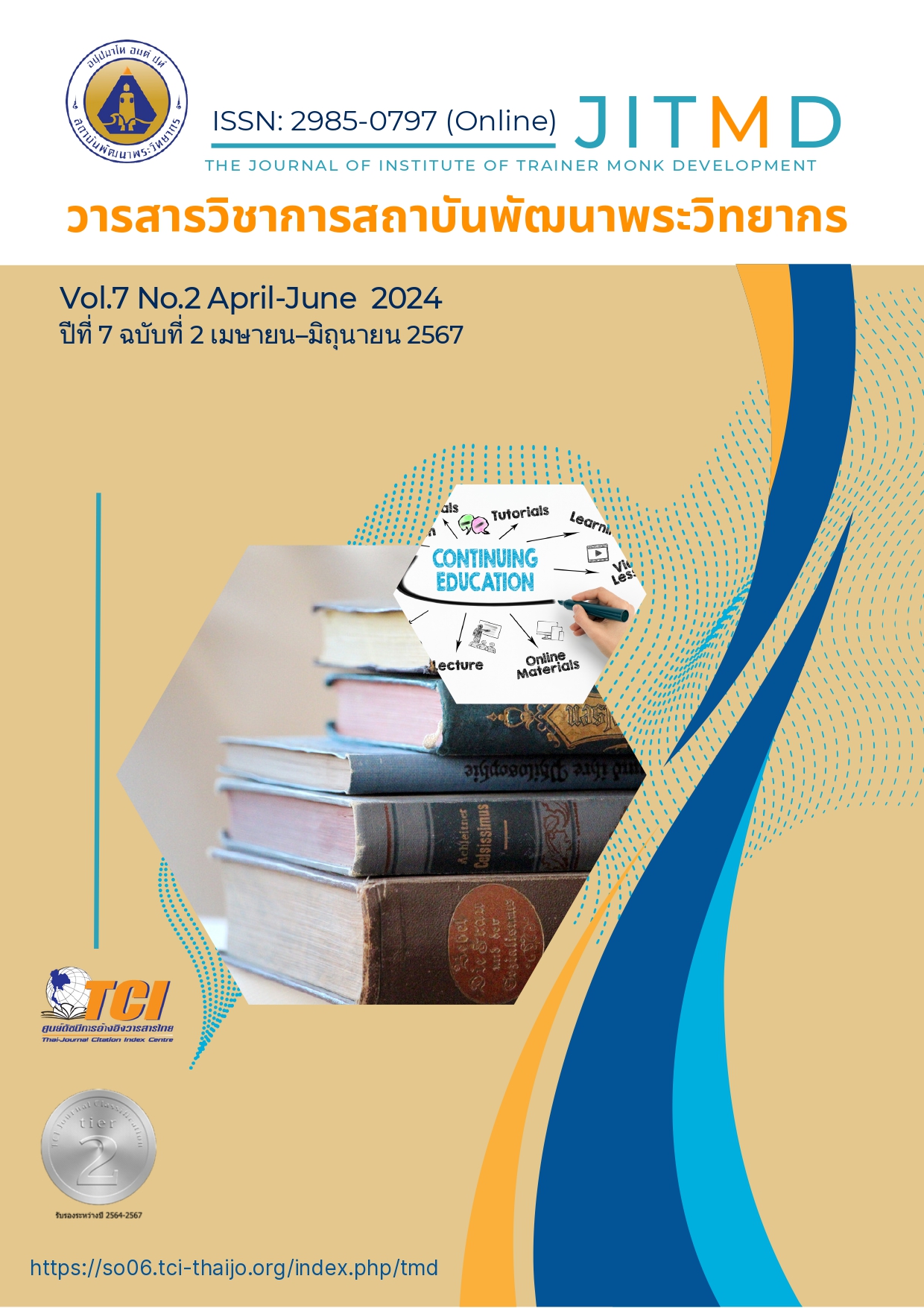The Principles of Bhavana 4 of Administrators and Personnel Management in School under Nonthaburi Secondary Educational Service Area Office
Main Article Content
Abstract
The objective of this research was; 1) to study the 4 principles of development of administrators under Nonthaburi Secondary Educational Service Area Office 2) Study tour of personnel management in educational institutes under the Office of Secondary Education Service Area 3) To study the relationship between the four principles of Bhawana of administrators and personnel administration in educational institutions under the Office of Nonthaburi Secondary Education Service Area. The results of research were found that: 1) Principles of Prayer 4 of Educational Institution Administrators under the Secondary Educational Service Area Office, Nonthaburi Overall, the average is at a high level. When considering the mean on each side, it was at a high level in all aspects. Sorted by average from the highest to the lowest, namely physical meditation, intellectual meditation, moral meditation, mental meditation, respectively. 2) Personnel management of school administrators under the Secondary Educational Service Area Office, Nonthaburi, as a whole, was at a high level. When considering the average of each aspect was at a high level in all aspects. Sorted by average from highest to lowest, namely Discipline and Discipline. Manpower planning and determination Improving the efficiency of government operations Recruitment and appointment to resign from government service. 3) Principles of Bhavana 4 of administrators and personnel administration in educational institutions had a high overall relationship (Rxy = 0.94) and a statistically significant positive relationship at the 0.01 level.
Article Details

This work is licensed under a Creative Commons Attribution-NonCommercial-NoDerivatives 4.0 International License.
บทความที่ได้รับการตีพิมพ์เป็นลิขสิทธิ์ของวารสารวิชาการสถาบันพัฒนาพระวิทยากร
ข้อความที่ปรากฎอยู่ในบทความที่ได้รับการตีพิมพ์ในวารสาร ถือเป็นความรับผิดชอบของผู้เขียนบทความ และข้อคิดเห็นนั้นไม่ถือว่าเป็นทัศนะและความรับผิดชอบของกองบรรณาธิการวารสารวิชาการสถาบันพัฒนาพระวิทยากร
References
พรทิพย์ โภไคยอดุม. (2561). การประเมินความพึงพอใจต่อผลการเรียนรู้ด้านมีคุณธรรมในวิชาพุทธบัณฑิตจุฬาฯ สง่างามของนิสติจุฬาลงกรณ์มหาวิทยาลัย. วารสารวิชาการคุณธรรมความดี, 1(1): 79-92.
พัชรินทร์ แจ้งอิ่ม. (2562). การพัฒนาคุณภาพชีวิตการทำงานของผู้บริหารสถานศึกษาตามหลักภาวนา 4 ในเขตอำเภอท่าตะโก จังหวัดนครสวรรค์. วิทยานิพนธ์พุทธศาสตรมหาบัณฑิต. บัณฑิตวิทยาลัย: มหาวิทยาลัยมหาจุฬาลงกรณราชวิทยาลัย.
พระพรหมคุณาภรณ์ (ป.อ. ปยุตโต). (2550). รุ่งอรุณของการศึกษาเบิกแห่งการพัฒนาที่ยั่งยืน. (พิมพ์ครั้งที่ 3). กรุงเทพฯ: พิมพ์สวย.
พระพรหมคุณาภรณ์ (ป.อ. ปยุตฺโต). (2559). พจนานุกรมพุทธศาสตร์ ฉบับประมวลธรรม. (พิมพ์ครั้งที่ 36). กรุงเทพฯ: ผลิธัมม์.
สำนักงานเขตพื้นที่การศึกษามัธยมศึกษานนทบุรี. (2559). รายงานผลการดำเนินงานประจำปีงบประมาณ พ.ศ. 2559. นนทบุรี: สำนักงานเขตพื้นที่การศึกษามัธยมศึกษานนทบุรี.
สำนักงานคณะกรรมการการศึกษาขั้นพื้นฐาน. (2553). คู่มือการปฏิบัติงานผู้บริหารสถานศึกษา. กรุงเทพฯ: โรงพิมพ์ชุมนุมสหกรณ์การเกษตรแห่งประเทศไทย จำกัด.
พระกองสี ญาณธโร (พรมโพธิ์). (2560). ศึกษาวิเคราะห์การดำเนินชีวิตตามหลักภาวนา 4 ในพระพุทธศาสนา. วารสาร มจร.อุบลปริทรรศน์, 2(3): 88-102.
พระมหาภัคศิษฐ์ มหาวิริโย และพระมหามิตร ชิตปญฺโณ. (2560). การพัฒนาคุณภาพชีวิตตามหลักภาวนา 4. วารสารบัณฑิตศึกษามหาจุฬาขอนแก่น, 4(1): 42-54.
พระสราวุฒิ ปญณาวุทฺโผ. (2560). การพัฒนาคุณภาพชีวิตของผู้สูงอายุตามแนวพระพุทธศาสนาในเขตเทศบาลตำบลวังหงส์ อำเภอเมือง จังหวัดแพร่. วารสาร มจร พุทธปัญญาปริทรรศน์, 2(2): 55-66.
มหาวิทยาลัยสุโขทัยธรรมาธิราช. (2561). คู่มือการจัดระบบการเรียนการสอน ที่ยึดผู้เรียนเป็นศูนย์กลางการเรียนรู้. กรุงเทพฯ: เทียนวัฒนา พริ้นท์ติ้ง.
อนุกูล บุญรักษา. (2554). การพัฒนาทรัพยากรมนุษย์ตามหลักภาวนา 4 ของกองปัญชาการมณฑลทหารบกที่ 31. วิทยานิพนธ์พุทธศาสตรมหาบัณฑิต. บัณฑิตวิทยาลัย: มหาวิทยาลัยมหาจุฬาลงกรณราชวิทยาลัย.
Hinkle. (1998). Organization: Theory and Classical Concepts. New York: Holt, Rinchart and Winston.


